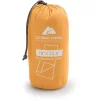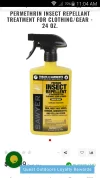Hi Doug
nothing more but simply stating a fact that a good number of folks say\plead\whatever not to use it while others say that you almost have to
No disrespect to anyone is intended; look at it as a 50/50 'chance to get it right...or wrong' i.e.
Go figure
In someway, slightly confusing (yes I can understand the need to protect myself and at the same - what if my bunk neighbor happens to have an allergy?) which is why I included the 2 memes in my post.
Hope that explained it ✌


I agree that there is a wide variety of opinion expressed here, and some of it appears to be remarkably ill-informed.
And the rub is that you are likely to make one of several types of errors. The first is if you haven't been bitten, that you assert to the effectiveness of any treatment you did, or disclaim that any treatment was needed if you didn't treat your gear. Neither conclusion is justified. You just might have been fortunate enough not to have slept anywhere with bedbugs, and treatment or non-treatment wasn't the issue.
The second is more complex, and that is that if you do get bitten having treated your gear, claiming the treatment is ineffective. Permethrin and other members of the family are insecticides, and not insect repellants. They will kill a significant proportion of most bed bug populations within several minutes, but it is a real possibility that this time will not be short enough to prevent them having a last supper. What you will have done is interrupted their breeding cycle and reduced the risk of them hitching a lift (alive) with you, not of using you for a final feed.
I understand that the permethrin molecule binds quite tightly to treated fabric. If you have soaked or sprayed your gear beforehand and let it dry, there is little if any risk to others. Very little is transmitted through the skin, and it doesn't evaporate. So unless your bunk neighbour has special rights to be inside your sleeping bag with you, they won't be at much risk.
It would be a quite different situation were you to try to apply a spray treatment in a dormitory, when the permethrin is still in solution and you could get a higher level of contact transfer while it is drying, as well as the prospect of over-spray onto beds, bedding, other peoples gear etc. Not necessarily a good thing to even think of doing.
If you don't like to use 'synthetic' compounds, that's a personal choice, and there are natural pyrethroid alternatives. It appears that these wash out much more quickly than permethrin, and should be re-applied more frequently. Or one might choose not to treat at all.
In all of that, it is advisable not to let treated gear, like a sleeping bag liner, come into contact with moist areas of your body, such as genitalia, and eyes, nose and mouth. Sleeping naked and covering your face with treated gear should not be considered if you have treated your sleeping gear, Similarly, underwear should not be treated at all, only outerwear garments like trousers, shorts and shirts.



























